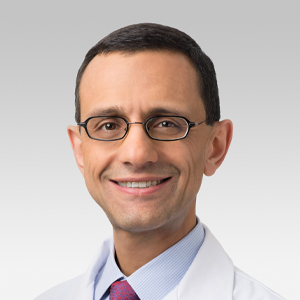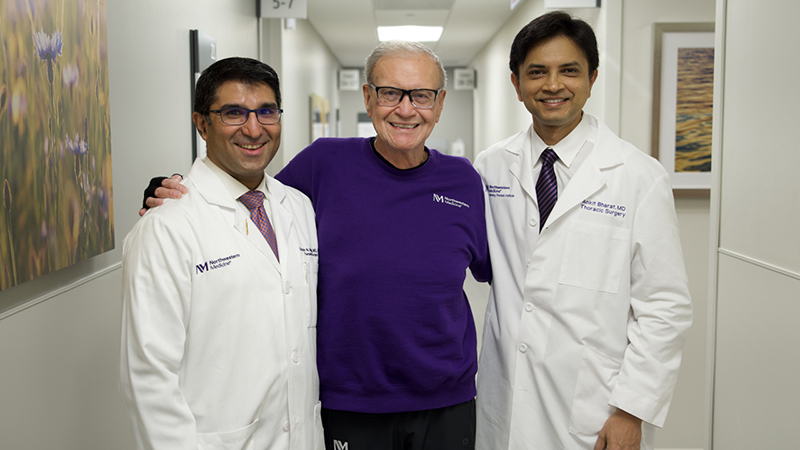Neurosurgery and Heart Surgery Teams Help a Chicago Dad With a Dangerous Condition
Bacteria Stuck to a Heart Valve Caused a Stroke
Published August 2022
In July 2021, Jay Keller wasn't feeling like himself. The Chicago-based architect, husband and father had fatigue and cold-like symptoms.
"I thought maybe I had Lyme disease, COVID-19 or walking pneumonia; I just wasn't sure," says 48-year-old Jay.
By September, he had developed horrible headaches, and was admitted to Northwestern Memorial Hospital for testing. Blood work showed that Jay had endocarditis (an infected heart valve) from Streptococcus mutans, oral bacteria that can cause cavities.
Jay came to the right place.— Babak Jahromi, MD, PhD
"We're all exposed to little bits of bacteria from the mouth, but Jay's stuck to his valve because he had a congenital heart abnormality. He was born with two aortic valve leaflets instead of three, called a bicuspid aortic valve. It's associated with a higher risk of cardiovascular complications, including endocarditis," says Karen M. Krueger, MD, infectious diseases specialist at Northwestern Medicine.
The way Jay's heart was formed caused the infection to get worse — and become life-threatening.
"Because of the two-leaflet valve, the flow across that valve was not normal, and it led to the valve getting infected more easily. Jay developed an infection of that valve, which then caused a stroke," says Duc Thinh Pham, MD, cardiac surgeon at Northwestern Medicine.
An Eight-Hour Brain Surgery
Each time Jay's heart would beat, it pushed blood through the infected valve and moved the infection into his brain, causing an infected mycotic brain aneurysm, which is a very dangerous condition associated with high rates of morbidity and mortality. Due to the important blood vessels involved, Babak S. Jahromi, MD, PhD, neurosurgeon at Northwestern Medicine, had to perform a rare, eight-hour brain surgery on Jay called a double bypass for a mycotic aneurysm.
Dr. Jahromi removed the aneurysm and sewed the affected brain blood vessels to unaffected brain blood vessel segments to keep blood flowing to all areas of Jay's brain.
"It's basically redoing the plumbing of the brain by cutting out the part that's bulging out and getting the remaining tubes to connect to each other," says Dr. Jahromi. "Having this type of brain aneurysm is very uncommon and having that be related to a heart infection is even more uncommon. Jay came to the right place because Northwestern Medicine had the right team to deal with potential simultaneous disasters."
Better Already
Just a few days after brain surgery, Jay was already up and walking the hospital hallways. He logged seven miles in one day, and he couldn't believe how much better he felt after not feeling like himself for so long.
Collaborative Care Gets Jay Over the Finish Line
Two months later, Jay was back in the operating room with Dr. Pham who fixed the infected heart valve. During this procedure, Jay's surgery team also found a small hole in his heart that they were able to repair.
In spring of 2022, Jay finished cardiac rehabilitation, and he's ready to get back to running, biking, swimming, and spending quality time with his wife, Grace, and their 7-year-old son, Hudson.
"Obviously, it takes on a little more appreciation when you go through something like this," said Keller. "You go back and re-visit your priorities."






